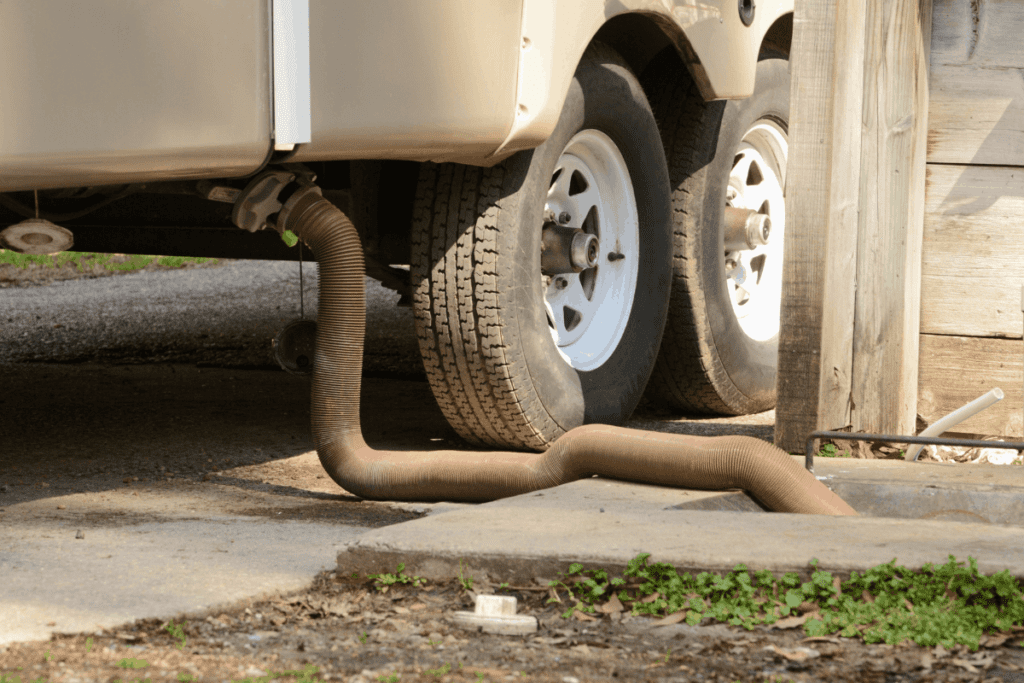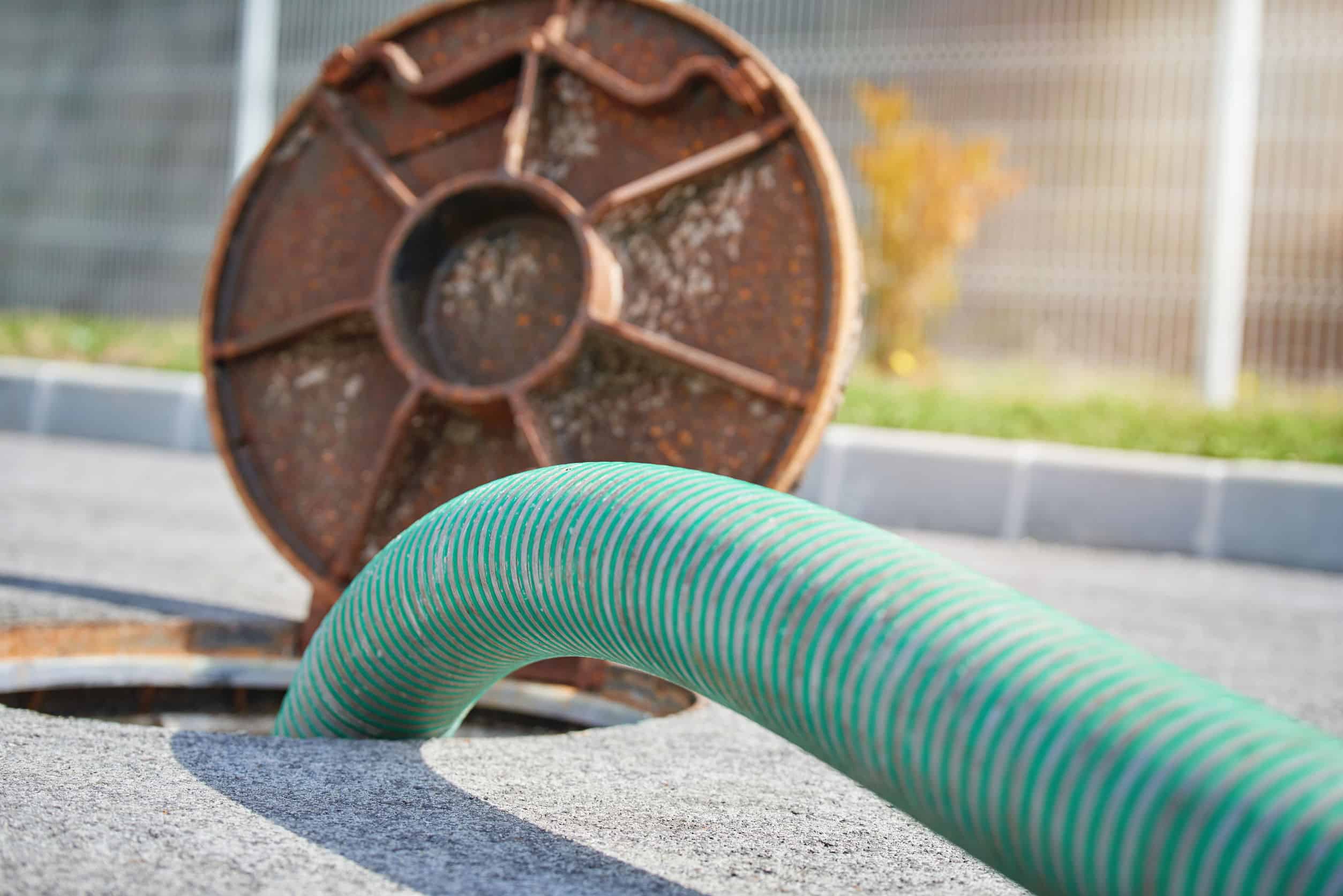If you’re an avid RV enthusiast, you may have wondered about the best way to dispose of waste from your recreational vehicle. Look no further! In this article, we will explore the safe disposal of recreational vehicle waste and answer the burning question: Can I empty my RV into my septic tank? We’ll guide you through the dos and don’ts of RV waste disposal, providing you with a clear understanding of the most environmentally-friendly and responsible methods. Join us as we unravel the mystery and ensure your RV journeys are both enjoyable and eco-conscious.
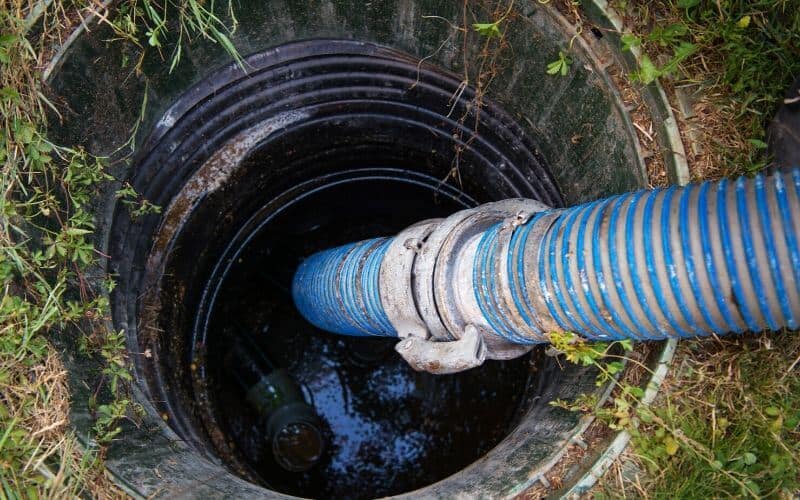
Understanding RV Waste
Different types of waste generated in an RV
When it comes to an RV, waste can be categorized into two main types: black water waste and gray water waste. Black water waste refers to the waste that comes from the toilets in the RV. This waste contains human waste and is typically stored in a dedicated holding tank. Gray water waste, on the other hand, refers to the waste that comes from sinks, showers, and laundry facilities in the RV. This waste primarily consists of soapy water, food particles, and dirt.
The importance of proper waste disposal
Proper waste disposal is crucial for several reasons. Firstly, it helps to maintain a clean and hygienic environment within the RV. Handling waste properly ensures that you and your fellow passengers are not exposed to any health risks associated with waste materials. Additionally, proper waste disposal is essential for preventing contamination of natural water sources and protecting the environment. By disposing of waste responsibly, you contribute to the preservation of the ecosystems that you encounter during your travels.
RV Holding Tanks
Types of holding tanks in an RV
RVs are equipped with two types of holding tanks: black water tanks and gray water tanks. The black water tank is designed to store the waste from the RV’s toilets, while the gray water tank holds the waste from sinks, showers, and laundry facilities. These tanks are usually constructed from durable materials such as plastic or fiberglass and are designed to be both watertight and odor-proof.
Capacity and management of holding tanks
The size of the holding tanks in an RV can vary depending on the model and manufacturer. Larger RVs typically have larger holding tanks to accommodate more waste. It is important to be aware of the capacity of your RV’s holding tanks to ensure that you do not exceed their limits. Proper management of the holding tanks involves monitoring the levels of waste and emptying them regularly at designated dump stations or through other appropriate disposal methods.
Septic Tank Basics
What is a septic tank?
A septic tank is an underground chamber that is used to treat and dispose of wastewater from buildings that are not connected to a municipal sewer system, such as RVs or residences in rural areas. The tank is typically made of concrete or fiberglass and is divided into two compartments. The first compartment receives the wastewater and allows solid waste to settle at the bottom, while the liquid waste flows into the second compartment for further treatment.
How does a septic tank function?
The functioning of a septic tank relies on the natural process of anaerobic digestion. Once the solid waste settles at the bottom of the first compartment, bacteria break it down over time. This process produces gases and sludge, which are then trapped in the tank. The liquid waste that flows into the second compartment is further treated by allowing it to undergo biological decomposition before being discharged into a drain field or leach field.
Components of a septic tank system
In addition to the septic tank itself, a septic tank system includes several other components. These include the inlet pipe, which carries waste into the tank, the outlet pipe, which allows treated water to flow out of the tank, and a distribution box or drain field to disperse the treated water into the soil. These components work together to ensure the proper functioning and disposal of wastewater from the septic tank.
Compatibility Issues
Differences between RV waste and septic tank contents
While RV waste and septic tank contents both contain human waste and water, there are some key differences between the two. RV waste often contains chemicals from toilet treatments, such as deodorizers and sanitizers, which may not be present in a septic tank. Additionally, the levels of waste in an RV holding tank can vary greatly depending on the frequency of use and the number of occupants. These differences can impact the treatment and disposal of the waste if not properly managed.
Potential problems arising from mixing RV waste with septic tank contents
Mixing RV waste with septic tank contents can lead to a range of problems. The chemicals present in RV waste can disrupt the natural bacteria balance in the septic tank, affecting its ability to efficiently break down waste. This can result in the accumulation of solid waste in the tank, leading to clogs, backups, and potentially costly repairs. Furthermore, the high volume and concentration of waste from an RV can overwhelm the septic tank, causing it to overflow or fail to treat the wastewater properly.
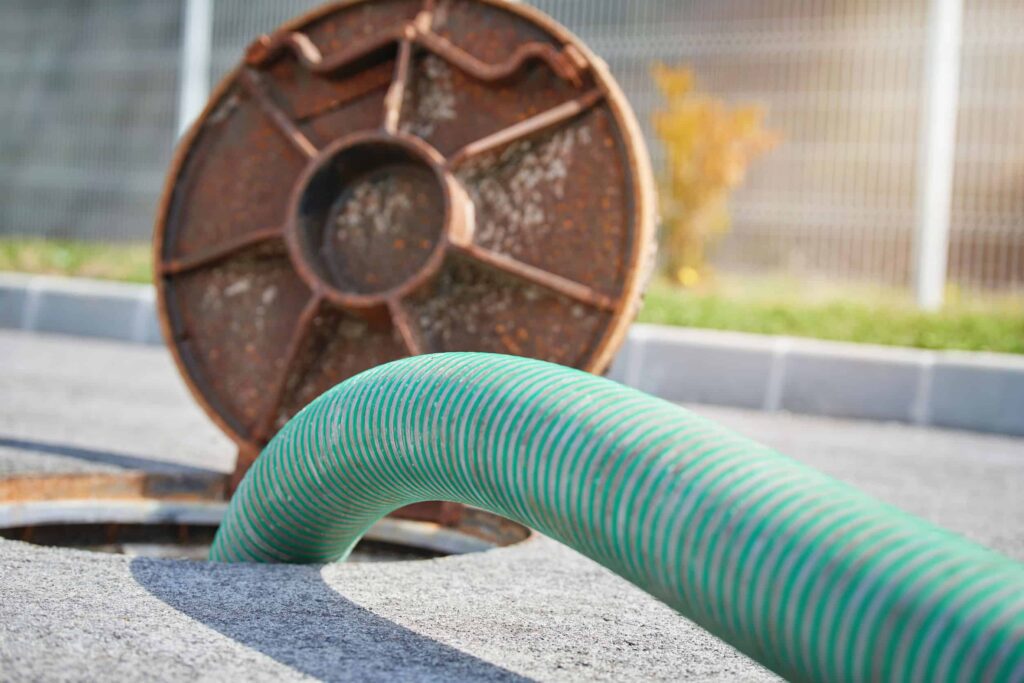
Environmental Considerations
Impact of RV waste on the environment
Improper disposal of RV waste can have a significant negative impact on the environment. When waste is dumped improperly, it can contaminate soil, water sources, and wildlife habitats. The chemicals in RV waste can be toxic to plants and animals, leading to ecological imbalances and the destruction of natural ecosystems. Additionally, the excessive use of dump stations or illegal dumping can lead to overflowing or poorly maintained facilities, further contributing to environmental degradation.
Regulations and guidelines for RV waste disposal
To mitigate the environmental impact of RV waste, various regulations and guidelines have been put in place. Many areas have designated dump stations specifically for RV waste disposal, ensuring that the waste is treated and disposed of properly. It is important to familiarize yourself with the specific regulations and guidelines in the locations you visit to ensure compliance and minimize harm to the environment.
Safe Disposal Options
Using designated RV dump stations
Designated RV dump stations are the most common and recommended method for disposing of RV waste. These stations are equipped with the necessary infrastructure for safely handling and treating the waste from RVs. They often include dumping areas, rinse hoses, and waste treatment facilities. Utilizing these dedicated dump stations ensures that the waste is properly managed and does not pose a risk to the environment or public health.
Utilizing portable waste tanks
Another option for safe RV waste disposal is the use of portable waste tanks. These tanks can be connected to the RV’s plumbing system and allow you to collect the waste and transport it to a designated dump station for disposal. Portable waste tanks are particularly useful when camping in remote areas without access to dump stations. However, it is important to handle and store these tanks properly to prevent spills and contamination.
Benefits and limitations of each disposal option
The choice between using designated RV dump stations and portable waste tanks depends on your specific needs and circumstances. Dump stations provide a convenient and reliable method of waste disposal, ensuring proper treatment and containment. On the other hand, portable waste tanks offer flexibility for RV owners who frequently camp in locations without dump stations. However, they require additional maintenance and precautions to prevent leaks or spills. It is important to weigh the benefits and limitations of each option to determine the most suitable disposal method for your RV waste.
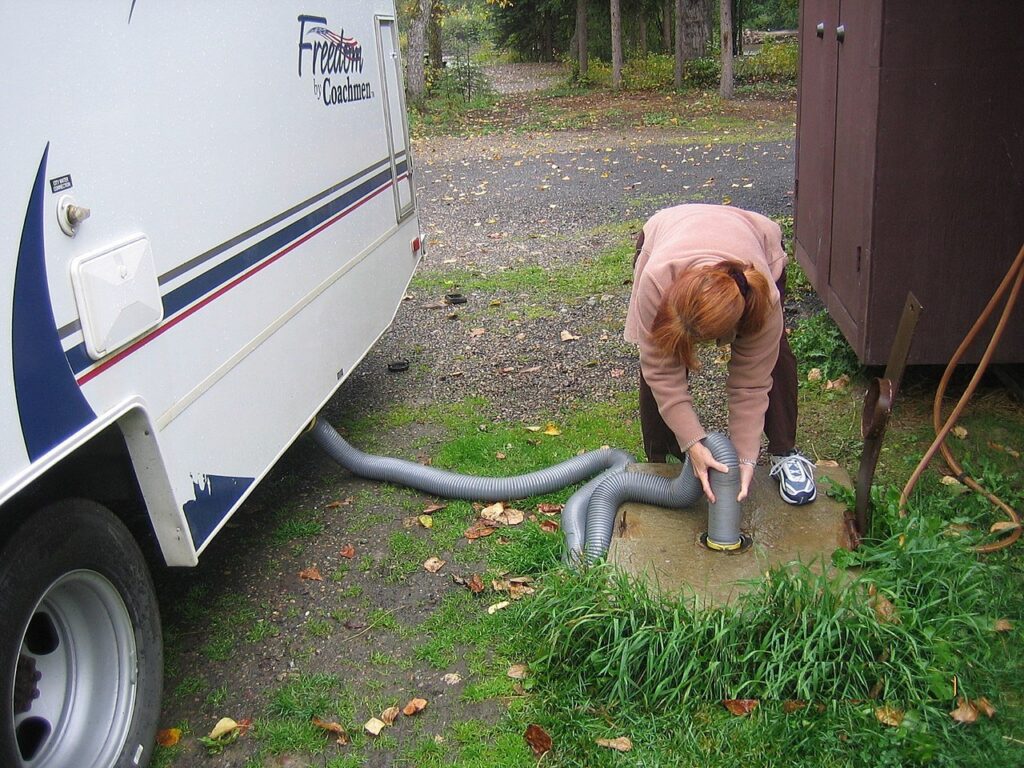
The Risks of Emptying an RV into a Septic Tank
Potential damage to septic tank system
Emptying an RV directly into a septic tank can pose risks to the septic tank system. The chemicals present in RV waste, such as disinfectants and deodorizers, can disrupt the natural biological processes in the septic tank. This can lead to imbalances in bacteria populations and hinder the efficient breakdown of waste. Over time, the accumulation of sludge and solids can cause clogs and backups in the septic tank system, potentially resulting in costly repairs or replacement.
Health risks associated with improper disposal
Improper disposal of RV waste, including emptying it into a septic tank, can pose health risks to both humans and animals. The presence of chemicals and high levels of waste can contaminate the water supply, making it unsafe for drinking or recreational use. Exposure to contaminated water can lead to gastrointestinal issues, infections, and other health problems. To protect your health and the well-being of others, it is essential to dispose of RV waste properly and follow the recommended guidelines.
Legal consequences of illegal dumping
Dumping RV waste, or any waste for that matter, illegally can have severe legal consequences. Many jurisdictions have strict regulations regarding waste disposal, and illegal dumping can result in hefty fines and penalties. Additionally, the environmental damage caused by illegal dumping can lead to criminal charges. It is crucial to respect the laws and regulations regarding waste disposal and to dispose of your RV waste responsibly to avoid any legal ramifications.
Understanding Septic Tank Maintenance
Importance of regular septic tank pumping
Regular septic tank pumping is crucial for maintaining the proper functioning of the septic tank system. Over time, solid waste and sludge accumulate in the first compartment of the septic tank, reducing its capacity and efficiency. Pumping the septic tank removes the accumulated waste, preventing clogs and backups. Regular pumping helps to extend the lifespan of the septic tank system and reduces the risk of costly repairs or replacements.
Frequency of pumping based on household size and usage
The frequency of septic tank pumping depends on several factors, including household size and water usage. As a general guideline, septic tanks should be pumped every 3 to 5 years for an average-sized household. However, larger households or those with increased water usage may require more frequent pumping. It is important to consult with a professional septic tank service to determine the appropriate pumping schedule for your specific circumstances.
Hiring professional septic tank services
When it comes to septic tank maintenance, it is recommended to hire professional septic tank services. These professionals have the knowledge and expertise to assess the condition of your septic tank, perform necessary maintenance tasks, and ensure that the waste is properly disposed of. They can also provide guidance on best practices for waste management and offer valuable advice to prevent potential issues with your septic tank system.
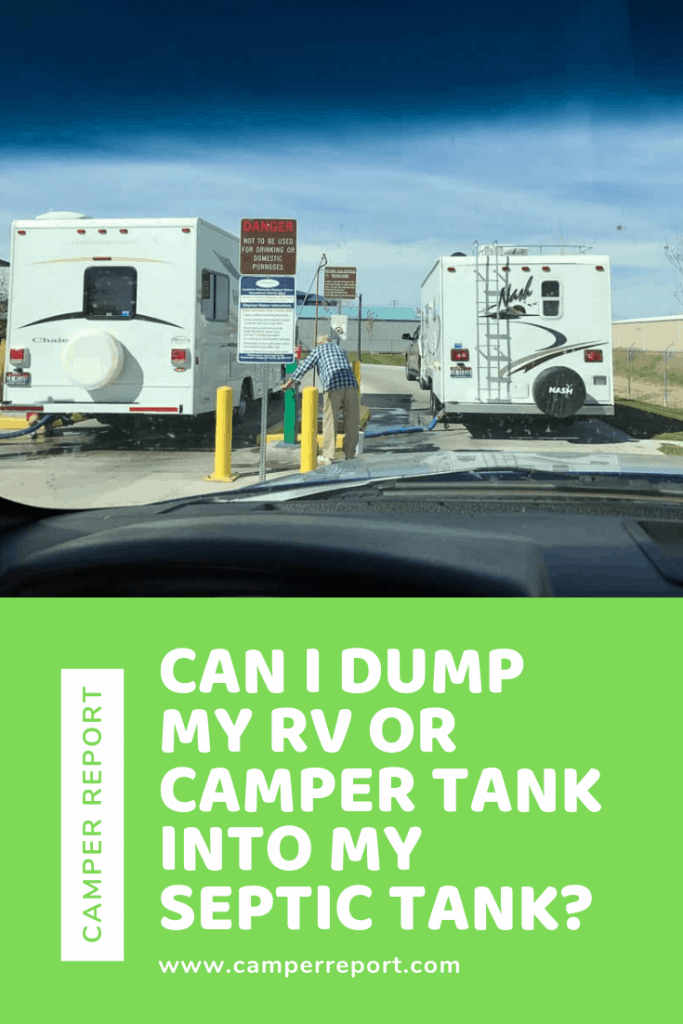
Alternatives to Septic Tank Disposal
Using RV-specific waste treatment systems
RV-specific waste treatment systems provide an alternative to septic tank disposal for RV owners. These systems are specifically designed for the unique waste produced in RVs and offer a compact and efficient method for treating and disposing of the waste. RV waste treatment systems often incorporate processes such as filtration, chemical treatments, or microbial digestion to break down the waste materials. However, it is important to comply with local regulations and guidelines when utilizing these systems to ensure proper disposal.
Composting toilets for RVs
Composting toilets offer another alternative to septic tank disposal, particularly for RV owners who prefer a more sustainable and eco-friendly approach. Composting toilets use organic materials and aerobic decomposition to break down waste and produce compost. These toilets do not require water or a connection to a septic tank system, making them a suitable option for off-grid RV living. However, they require proper maintenance and management to ensure effective composting and odor control.
Other innovative waste disposal methods
Innovation in waste disposal methods continues to evolve, offering new options for RV owners. Some examples of innovative waste disposal methods include biodegradable waste bags, which can be used to contain and dispose of solid waste in a more environmentally friendly manner. Additionally, certain RV parks and campgrounds may offer advanced wastewater treatment systems that can process RV waste on-site. Exploring these alternative methods can provide RV owners with additional choices for responsible waste disposal.
Conclusion
Understanding and properly managing RV waste is essential for every RV owner and enthusiast. By being aware of the different types of waste, the importance of proper waste disposal, and the compatibility issues between RV waste and septic tank contents, you can ensure a clean and hygienic environment within your RV. It is crucial to consider the environmental impact of RV waste and abide by regulations and guidelines for responsible waste disposal. By utilizing safe disposal options, being cautious about emptying RV waste into septic tanks, and understanding the importance of septic tank maintenance, you can maintain the longevity and efficiency of your septic tank system. Exploring alternative waste disposal methods, such as RV-specific waste treatment systems or composting toilets, showcases your commitment to responsible waste management. Ultimately, responsible waste disposal is not only beneficial for you and your RV but also contributes to the preservation and protection of the environment.
